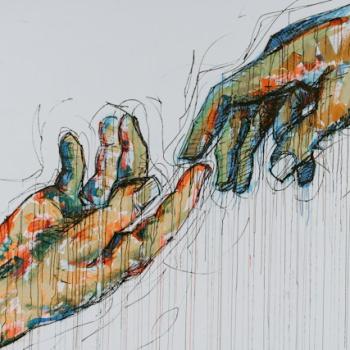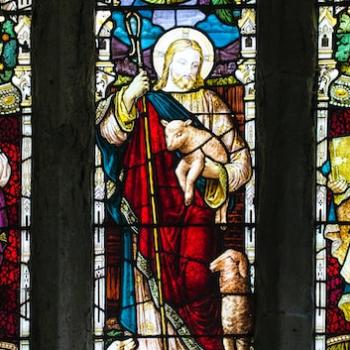
Longing. That word contains entire galaxies of meaning about unmet needs and aching desires. And “longing” is what I think today’s gospel reading is all about.
Sure, it’s also about Jesus wanting respite from the crowd. As I’ve written before, I see Jesus as a reluctant rock star, not entirely comfortable with the 24/7 demands of fame. “He said to [his disciples], ‘Come away by yourselves to a deserted place and rest a while.’ People were coming and going in great numbers, and they had no opportunity even to eat” (Mark 6: 31).
They hop aboard a boat and sail to a “deserted place” to grab a bite of food and wind down. But alas, the crowd has gotten wind of their plan, so when they arrive, throngs of adoring fans are there to greet them. “[Jesus’] heart was moved with pity for them, . . . and he began to teach them many things” (34). In other words, their longing for his message was so acute, so all-encompassing that Jesus couldn’t help but forgo food and rest a while longer to give them what they needed.
Not So Deserted
On some level, we all long for meaning. It’s in our cells. I think that even the most ostensibly superficial folks among us long for a way to understand the tiny chapter that is our individual lives as something significant in the larger, 14-billion-year narrative we know of as existence itself. We yearn for purpose.
Organized religion provides one response to that longing. Each one provides its own explanation for that purpose, it’s own spin on why are chapter was written. Today though, it’s rare to find crowds knocking down the doors of Catholic churches today like those who pursued Jesus in today’s gospel in search of truth.
Scary Statistics
In 1991, only 6% of Americans claimed no religious affiliation. But during the 90’s alone, those numbers more than doubled. By 2012, 20% fell into this category, and by 2016, the last year Public Religion Research Institute data is available, that figure was up to 25%. Young people in particular have moved this needle in dramatic fashion. The youth and young adults known as “nones” make up 39% of the demographic. Only 15% claim to be Catholic. Today, the bitter irony is that the “nones” are now the largest denomination. Surely, something is deeply, terribly wrong with organized religion if young people believe being “nothing” is more authentic than being “something.”
When do people leave the Catholic Church? A whopping 79% leave before age 23. And get this – only 7% of once-Catholic Millennials actively practice the faith today. Of course, what’s more important than when people leave is why. The majority, 60%, say they left because they stopped believing in the Church’s teachings. More specifically, 29% said that Church teachings about gay/lesbian issues prompted them to leave, and 19% blamed the clergy sex abuse scandal. Perhaps the most troubling statistic is this one – 60% of the “nones” say they believe in God. In other words, they aren’t leaving the Church because they no longer believe that God has a role to play in their search for meaning; they leave because they find that organized religion does more harm than good in fostering that faith.
To me, this is both completely understandable and painfully tragic at the same time. I choose to be Catholic for many reasons. But I also make that choice in spite of many others.
The crowds in today’s gospel reading are longing for what Jesus had to teach them: the primacy of love, the power of forgiveness, the need for unchecked, even illogical, compassion. The Church teaches these truths as well . . . but also attempts to spell out what they should look like in daily life. It’s some of those teachings about precisely what is and is not a “sin” that makes becoming a “none” more attractive to many than believing in something that doesn’t completely ring true.
Bottom Line
I have a longing of my own. I long for a day when the Church gets back to its original focus on Jesus’ central message, the one crowds were desperate to learn more about. I long for a day when black and white belief systems with easy answers give way to an embrace of the ambiguity the glorious grey of paradox and metaphor. I long for a day when faith no is no longer the detailed roadmap that tells me which exits to take and which speed traps to avoid but instead becomes the compass that helps me chart my own steps forward. I long for the day when being a “none” is the one option that doesn’t make any sense.











